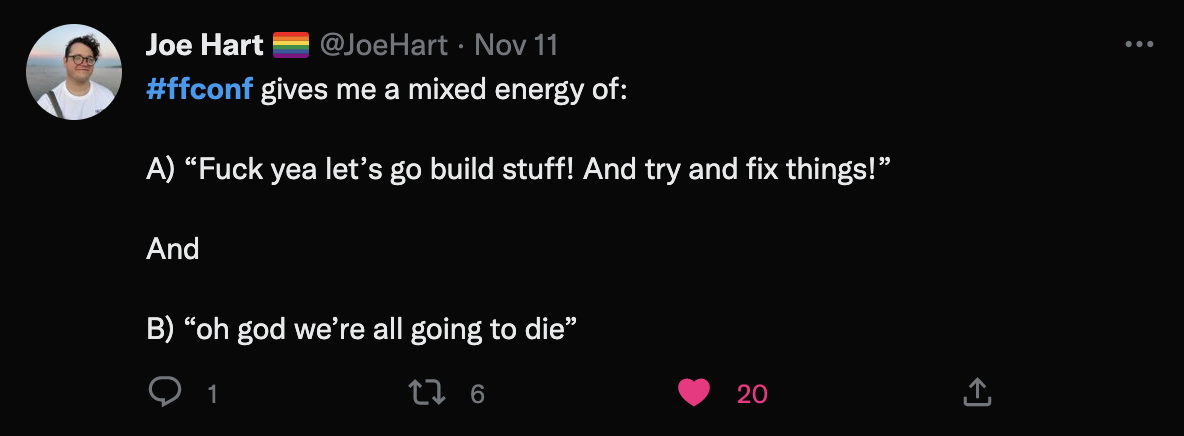Last week I headed to the coast for my first time at FF Conf - an annual web conference held in Brighton.
While some conferences have clear themes, what struck me about this one was the stark variation in the content and tone of the talks.
Joe Hart summed it up well on Twitter when he commented that it left him with a mixed energy of “Let’s go and build stuff!” and “We’re all going to die”

And it’s left me reflecting on the importance of holding space for multiple, sometimes competing truths.
Web work comes great responsibility
Florence Okoye opened the day with an important message about empowering the people we’re designing for.
She advised us to consider the relationships we want to create between us and the people we’re creating for, asking: “Is it one of solidarity? Assistance? Support? Is it reparative?”
Unless we take time to build these relationships with those communities, we can’t design inclusive, empowering experiences for them.
Lex Lofthouse pitched her talk at developers, arming them with knowledge and techniques to make intentional design choices in their work. I really like the idea of sharing responsibility for the outcomes of our work across disciplines, in contrast to the hard distinctions we often aim to draw between different roles.
Towards the end of the day, Sareh Heidari discussed a subject close to my heart: digital exclusion in healthcare. She talked about the importance of considering the needs of those who face barriers when accessing digital services, like people who:
- live in areas with poor connectivity
- use assistive technology
- have no fixed address
- are in poverty
As someone who writes for a living, Sareh’s notes on health literacy also struck a chord with me: 4 in 10 adults struggle with health content, and that jumps to 6 in 10 when that content includes statistics.
Our power to change the systems around us is limited - and that doesn’t mean we shouldn’t try
Heydon Pickering’s talk was probably the funniest conference talk I’ve ever seen, until it wasn’t. Social media’s algorithms favour divisive content that sells adverts, fuelling a culture war that distracts us as capitalism destroys the planet and everything we hold dear.
Rightfully, no magic answers were proffered. Instead, we were invited to take a stark look at the brokenness of our systems, and our relative powerlessness to change them.
Natalia Waniczek’s Working towards a greener world from behind the keyboard started out equally sobering, bolstered with terrifying statistics. I was horrified to learn that the internet is responsible for 3.7% of global greenhouse emissions - as much as the whole of the aviation industry, and the whole of Germany.
Although Natalia doesn’t subscribe to the narrative that individuals are personally responsible for climate change, she impressed upon us the importance of making small changes to the way we work, and lobbying for systems change.
I was heartened by Natalia’s closing message, that although we only have 10 years left to save the planet, that also means we still have 10 years left to save the planet.
Finding joy in our work matters
In contrast to the more solemn talks of the event, the day was scattered with a series of more hopeful, playful messages.
Sophie Koonin’s Love letter to the personal website explored how, through the commercialisation and monopolisation of the web, we’ve lost sight of the joy and creativity that once came with creating our own little corners within it.
As a once shy and awkward teen who spent many hours honing the perfect <marquee> for my own neocities extravaganza in the late 00s, I loved Sophie’s call to go forth and create more fun, weird content on the web.
Lily Madar’s talk, programming with yarn, was a perfect portion of post-lunch ASMR, drawing comparisons between crochet and computer programming with videos from a corner of the web I’m henceforth dubbing “LoomCore”.
Finally, Ruth John wrapped up the conference with a discotechnique delight constructed in the browser using a series of clever media APIs. As one of the Non-DevelopersTM in the audience, the technicalities of this one were a little beyond my understanding, but give me some chilled beats and pretty lights and I’m always happy.
Life is not binary
As I alluded to in the introduction, my prevailing takeaway from the day is this:
We have to make space for multiple, competing truths in our work.
As the people creating the digital world, we can accept the responsibility that comes with our work, and recognise the futility of our mission, and find moments of joy along the way.
Sometimes I feel such pressure to take a stance that I forget to engage with the messy middle ground - but that’s what life is. It’s a series of “and”s.
Life is not a dichotomy, it’s a paradox: a rich set of complex and conflicting ideas and experiences - and they all deserve a place.
So I’m thankful to all the speakers and to the organisers for this reminder to make room.